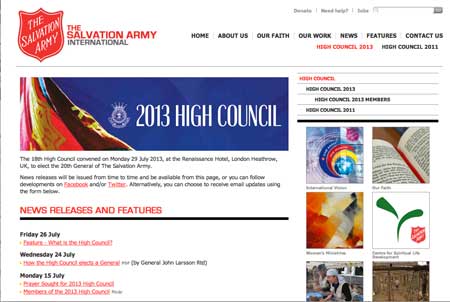
Much of what happens at the High Council is actually governed by British Law, as set out in the Salvation Army Acts (1931 to 1968), superseded by the Salvation Army Act (1980) which itself was amended by three deeds of Variation in 1995, 2005 and 2010. The 2013 High Council consists of 118 members (62 women and 56 men) made up of the Chief of Staff, all the active commissioners and territorial leaders (some territories are led by colonels), each of whom was summoned by the Chief of the Staff for the sole purpose of electing a new General.
An important point to note is that High Council members do not represent their commands or appointments, or even their countries of origin. So the territorial commanders from Zambia, Japan or Brazil, for instance, do not attend the High Council on behalf of Zambian, Japanese or Brazilian Salvationists. Each member is called upon to use discernment in understanding the will of God in making their choice.
The law requires that the High Council is held in the UK, although it does not specify where. This year’s High Council will be held at the gathering’s third host venue – the Renaissance Hotel, Heathrow, to the west of London. The 1934 and 1939 High Councils were held at Clapton Congress Hall in east London, with all other High Councils since the first in 1929 taking place at Sunbury Court in west London, which is currently undergoing a major refurbishment.
A common misconception is that the High Council includes discussion about faith issues or even Salvation Army protocols and happenings. This is not the case. The High Council meets for one purpose only – to prayerfully choose the next world leader of The Salvation Army.
The basics of the High Council are embedded in law but each gathering has a large degree of procedural freedom. The election of a president, vice president, chaplain and tellers is usually followed by a day or two establishing the procedures that will be followed in electing the General. In the past, nominations – made in secret – have been needed from three members for a person to be put forward for election. In theory, any Salvation Army officer can be nominated, but the reality is that all those with the requisite experience of leadership and ministry will already be members of the High Council.
What usually follows is that a set of questions is put together by a questions committee. This one set of questions is given to everyone that has accepted the nomination to stand for election (and, where appropriate, questions are also submitted to nominees’ spouses). The nominees prepare written responses which are then shared with the entire High Council.
The final voting is by secret ballot, with more than a two-thirds majority needed to win the election, unless it goes to a fourth vote, and subsequent votes if necessary where a majority will be enough. After each round, the nominee with the lowest number of votes drops out.
During this whole time, the members avoid contact with the outside world. They are together in fellowship and prayer, seeking the guidance of the Holy Spirit. The approach is similar to the Papal Conclave which gathers to elect a new Pope, although no one will be sealing the doors to the High Council!
Salvationists and friends are asked to surround the High Council and its members with prayer. Members of previous High Councils have spoken about being aware that they are being lifted up in prayer, and it is certain that this year will be no different.
From this new venue, made sacred for a handful of days, will emerge God’s choice to lead his Salvation Army in the years to come.
For the latest information, and to register for email updates, go to www.salvationarmy.org/HighCouncil2013. A Twitter feed, @HighCouncil2013, has also been set up, along with a Facebook page: www.facebook.com/HighCouncil2013
A more detailed description of the workings of the High Council – written by Retired General John Larsson – can be found on the High Council 2013 website.
Report by the Communications Section
International Headquarters









